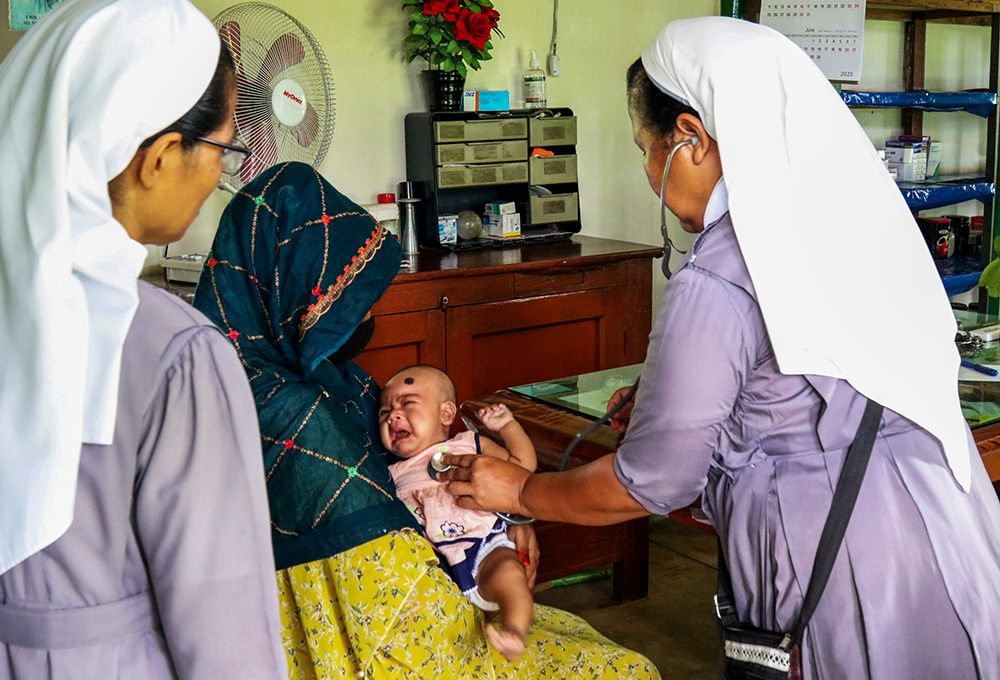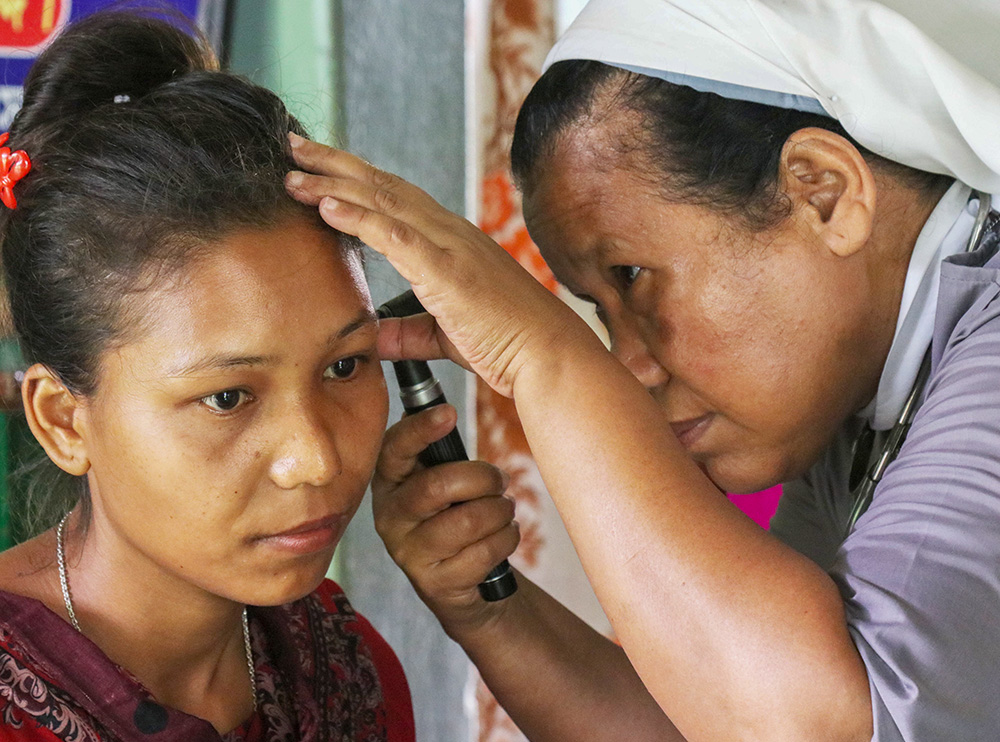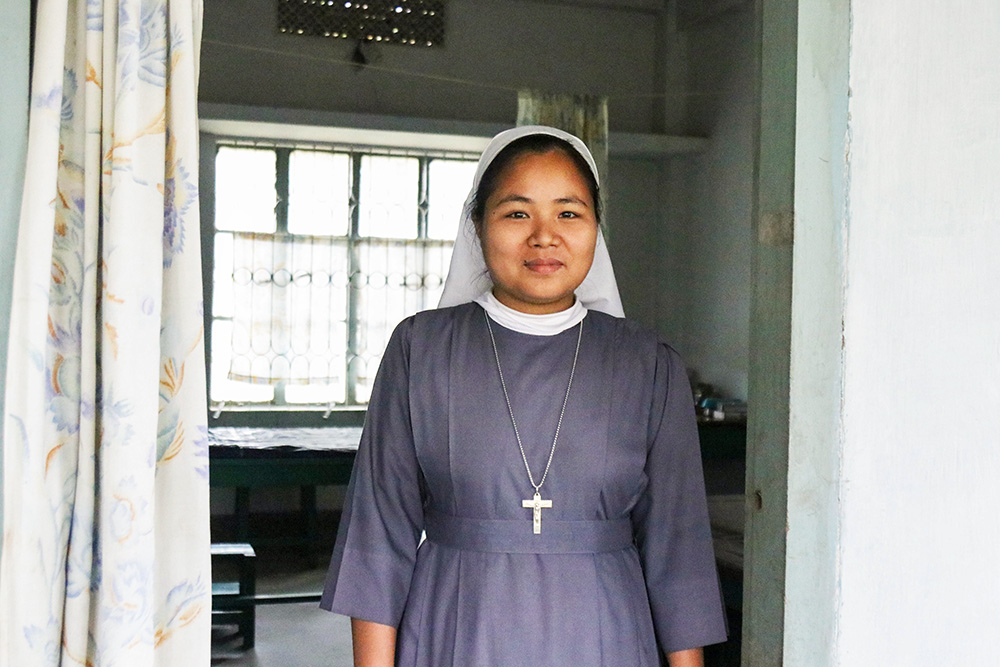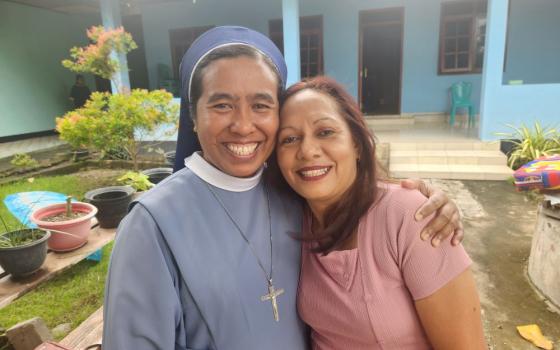
Salesian sisters treat a baby at Our Lady of Lourdes Hospital in Baromari, Sherpur, Bangladesh. According to recent data by UNICEF, more than 100,000 children in Bangladesh died before their fifth birthday in 2023, and almost two-thirds of these deaths occurred within the first 28 days of life. (GSR photo/Stephan Uttom Rozario)
Bangladeshi sisters have contributed to reducing maternal and infant mortality for decades in urban and rural areas at dispensaries, clinics and hospitals.
The Sisters of Mary Immaculate, who belong to the Salesian Family, operate six clinics in the remote areas of the dioceses of Mymensingh, Sylhet and hilly Chittagong.
Salesian Sr. Baptista Rema, 60, has spent more than 25 years of her life providing health care to poor Indigenous communities in these rural areas. Among other services, she provides medical care to pregnant mothers, offers health advice and performs deliveries.
Rema currently works at Our Lady of Lourdes Hospital in the Baromari Parish of Sherpur in the Mymensingh Diocese, 200 kilometers from the capital, Dhaka. Most of her patients travel to the hospital on three-wheeled local vehicles to seek her medical care.
"We perform an average of three [healthy] deliveries every month, and we also have an average of at least 10 pregnant women come every month for advice and regular checkups," Rema said.
She said the people in this area are poor and often lack basic education.
"When I graduated from nursing in 1999 and started working at the Mary Immaculate Dispensary in the Diocese of Sylhet, the infant mortality rate in that area was over 10%, but now it is one or two in 1,000," she told GSR.

Salesian Sr. Baptista Rema treats pregnant women and other patients in need daily. Pictured is an Indigenous woman who came to the hospital to seek treatment for her ears. (GSR photo/Stephan Uttom Rozario)
Rema worked at the Mary Immaculate Dispensary for more than six years. During this time, more than 50 babies were born under her care. After that, she moved to Our Lady of Lourdes Hospital and has been working there for almost 20 years.
Rema said she forbids expectant mothers from bathing in dirty ponds during pregnancy and from doing heavy work. She also advises them on nutrition, but is often met with resistance. "We tell them to eat eggs, milk and other nutritious foods, but there is a misconception among them that eating eggs will make the baby grow too big in the womb."
People from the villages she serves are poor, so even when she asks them to refrain from doing heavy labor, most do not have the luxury of not working. She lamented that many of her patients lose their babies due to abusive husbands, adding that she is also working to make rural women aware of these issues.
"As a result of our work, pregnant women know they can come talk to us. But many times, they do not follow our advice. There is still a lot of work to be done for [them]," she said.
Salesian Sr. Lucky Mree was recently given the responsibility of administering the Mary Immaculate Dispensary, although she has limited studies and experience in nursing.

Salesian Sr. Lucky Mree was recently given the responsibility of administering the Mary Immaculate Dispensary, although she has limited studies and experience in nursing. She believes that if more staff and medical equipment were available, she could serve a greater number of people in need. (GSR photo/Stephan Uttom Rozario)
"Not many patients come, though," Mree said. "They all go to private hospitals. Transportation is [more] convenient than [in the] past, and we do not have good medical equipment here."
She believes that if more staff and medical equipment were available, she could serve a greater number of people in need. Nevertheless, pregnant women regularly come to her for health checkups, and delivery patients still come to her dispensary because there are no other options.
Mary Hembrom, 35, gave birth to her second child at Our Lady of Lourdes Hospital on June 4, 2025, after eight years of marriage. "I went to the sister for health checkups twice a month, and she [Rema] delivered my child naturally," Hembrom, an Indigenous mother of two, told GSR.
She is a housewife, and her husband works as a day laborer. They are supporting their family on his modest income and the sisters are their only hope.
According to recent data by UNICEF, more than 100,000 children in Bangladesh died before their fifth birthday in 2023, and almost two-thirds of these deaths occurred within the first 28 days of life. Furthermore, the country records more than 63,000 stillbirths a year, the highest in South Asia.
Advertisement
Despite these statistics, government health authorities recognize the sisters' contributions toward reducing infant mortality.
Rabindranath Pramanik, who works for the Bangladesh government's health department, said, "Most of the work that the government needs to do is being done by their missionary organizations, and the sisters provide services in remote areas as well."
Pramanik also expressed his gratitude to the sisters for their work.
Rema said there is a need for widespread public health campaigns to reduce child mortality in rural areas. However, government health services are not available in remote areas, private health services operate strictly for profit, and the Indigenous communities remain largely forgotten.
"I will call on donor organizations to come forward to support these rural communities so that they receive proper medical services," Rema said, hopeful that she will soon have the resources to serve hundreds of people daily and modernize existing health centers in rural areas.






